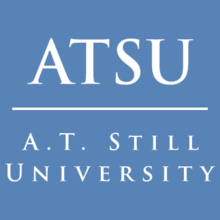A.T. Still University School of Osteopathic Medicine in Arizona
Coordinates: 33°22′57.86″N 111°42′18.30″W / 33.3827389°N 111.7050833°W
 | |
| Established | 2007 |
|---|---|
| Provost | Craig M. Phelps, D.O., FAOASM |
| Dean | Kay Kalousek, DO[1] |
Academic staff |
176 full-time[2] 469 part-time[2] |
| Students | 425[3] |
| Location | Mesa, Arizona, USA |
| Campus | 22 acres |
| Website | atsu.edu/soma |
A.T. Still University School of Osteopathic Medicine in Arizona (ATSU-SOMA) is an osteopathic medical school in the United States granting the Doctor of Osteopathic Medicine degree. Established in 2007, ATSU-SOMA is located at the Mesa, Arizona campus of A.T. Still University. A.T. Still University (ATSU) is the original founding institution of osteopathic healthcare, established in 1892 by Andrew Taylor Still in Kirksville, Missouri.
SOMA is accredited by the Commission on Osteopathic College Accreditation (COCA) of the American Osteopathic Association (AOA).[4]
Campus
The campus operates in a portion of a 100,000-square-foot (9,300 m2) building on the 22 acres (89,000 m2) campus of A.T. Still University in Mesa. The campus is the anchor of the Arizona Health & Technology Park, a 132-acre (0.53 km2) education, healthcare, and technology triangle owned by ATSU and Vanguard Health Systems. The master plan for the new park includes hospitals, long-term care facilities, professional offices, and product development research facilities.
The campus is also home to the Arizona School of Health Sciences, Arizona School of Dentistry and Oral Health, and the 32,000-square-foot (3,000 m2) East Valley Family YMCA.[5]
Curriculum
The curriculum at SOMA is unique in that all of the clinical education is based at one of twelve community health centers throughout the country.[6]
Training
SOMA uses the Clinical Presentation Educational Model which teaches that there are about 120 different ways that a patient can present themself to a physician. The teaching method was based on a method developed in 1994 by the University of Calgary.[7] Basic sciences are coupled with clinical sciences so that the students have a more comprehensive and practical foundation for each medical discipline.[8] The curriculum design emphasizes clinical competencies which allows students to enter residency programs with greater experience with chronic disease than students educated in the majority of tertiary care-oriented academic health centers.[7]
Community Health Center Locations
SOMA is unique in that the first year is spent at the Mesa campus and the last three years at one of many community health centers. As of 2016, SOMA offers 12 community health center opportunities in such locations as:[9]
- Unity Health Care - Washington, DC
- Waianae Coast Comprehensive Health Center - Wai'anae, Oahu, HI
- Beaufort-Jasper-Hampton Comprehensive Health Services – Ridgeland, South Carolina
- Health Point (previously Community Health Centers of King County) – Suburban Seattle, Washington
- El Rio Community Health Center – Tucson, Arizona
- Family Healthcare Network – Tulare County, California
- HealthSource of Ohio – Mt Orab, Ohio
- North Country Healthcare – Flagstaff, Arizona
- Northwest Regional Primary Care Association – Portland, Oregon
- Adelante Healthcare – Phoenix, Arizona
- Sunset Park Family Health Center – Brooklyn, New York
- Near North Health Service Corporation - Chicago, Illinois
Historical Deans
- Thomas E. McWilliams (Interim Dean-2012)
- Kay Kalousek (2012–2015)[10]
- Jeffrey Morgan (2015-current)
See also
References
- ↑ "Kalousek appointed dean of ATSU-SOMA". Heartland Connection. March 27, 2012. Retrieved May 12, 2012.
- 1 2 "Academic Fast Facts - School of Osteopathic Medicine - A.T. Still University". Atsu.edu. Retrieved 2012-05-26.
- ↑ "A.T. Still University–School of Osteopathic Medicine in Arizona (ATSU-SOMA)" (PDF). American Association of Colleges of Osteopathic Medicine.
- ↑ "ATSU-SOMA receives full accreditation status". ATSU News Releases. 1 June 2011.
- ↑ "Entries tagged with "Arizona Health & Technology Park" » » News Releases – A.T. Still University". News.atsu.edu. Retrieved 2012-05-26.
- ↑ Chen, Candace; Mullan, Fitzhugh (June 2009). "The separate osteopathic medical education pathway: uniquely addressing national needs. Point." (PDF). Academic Medicine. 84 (6): 695. doi:10.1097/ACM.0b013e3181a3dd28. PMID 19474535. Retrieved 3 November 2012.
- 1 2 "Faculty Interview: ATSU-School of Osteopathic Medicine in Arizona". The Student Doctor Network. 10 November 2008.
- ↑ "Student D.O. Day at ATSU-SOMA Flyer" (PDF).
- ↑ Handout, SOMA, October 2010
- ↑ "Kalousek appointed dean of ATSU-SOMA » News Releases – A.T. Still University". News.atsu.edu. Retrieved 2013-01-25.